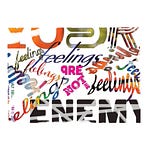
Disclaimer: This piece discusses experiences of trauma and abuse, including emotional manipulation, psychological harm, and the lasting impacts of a controlling environment. Readers who have experienced similar situations may find some descriptions triggering or emotionally challenging.
Take care as you read, and remember to honor your own boundaries.
It’s about the echoes of powerlessness still residing in me—the parts hesitating to stand out or step into my full self. And yet, I also see how far I’ve come.
The Ripple of Powerlessness
It’s been some time since the 2024 U.S. election, yet its impact lingers.
The wounds it reopened remain unhealed.
On November 6th, the news of Trump’s re-election reached me here in Germany. Even from this distance, the outcome rippled through me in unexpected ways.
It wasn’t just disappointment or anger—it was something deeper, stirring a sense within me of memories still out of reach, ones I can feel but not yet fully access.
I quickly realized my reaction wasn’t just about a political event. The news brought back the heavy sensation of powerlessness, a force I knew intimately as a child. Between the ages of 11 and 16, my world revolved around survival in a home controlled by my mother. Her borderline tendencies and narcissistic patterns shaped an environment where my inner self had no space to exist.
The Corruption of the Self
At the age of eleven, this self retreated into voluntary exile to protect itself. It became inaccessible, a part of me that withdrew from the external world to avoid being destroyed.
In its place, a corrupted self emerged, born out of the necessity to survive in a hostile environment. It was not shaped through conscious intention but through adaptation to external pressures and internal distress. This self seamlessly assumed any role required to meet expectations and avoid conflict.
This corrupted self was not a shield but a survival mechanism. It allowed me to exist within a family dynamic where even my thoughts were not safe.
A Life Under Surveillance
My mother didn’t control everything outwardly—my short, gender-nonconforming hair, for example, remained untouched—but her influence ran so deep I didn’t dare consider escape.
I knew I wouldn’t make it to the city limits. She and my father together knew literally everyone in our small town.
People I didn’t know would approach me, yet they knew exactly who I was. The thought that they might report back to my mother overshadowed every interaction. And it didn’t stop there: if I didn’t behave as expected, I would have to answer to them. Ultimately, they would send me straight back home—to be held accountable by my mother.
This web of control and surveillance permeated every aspect of my life.
The Burden of the Scapegoat
At home, I wasn’t just blamed for what went wrong—I was made responsible for it.
I became the embodiment of the family scapegoat, absorbing her frustration and carrying the weight of her unmet expectations.
Anything that didn’t go according to plan, wasn’t done properly, or wasn’t done at all became my fault. In her words, I was “fett, faul, gefräßig” (“fat, lazy, gluttonous”)—a label that eroded my sense of self and cemented my role as the target for the chaos in her mind.
I learned to anticipate her needs—not out of love or care, but to shield myself from the danger and rage she directed at me. Even my thoughts didn’t feel safe. Survival demanded constant vigilance and adaptation, a role that consumed me entirely.
The Weight of Punishment
Frequently, she would berate me for not following instructions she believed she had given—though she had never actually spoken them aloud. When I dared point this out, her rage would escalate, and I'd face punishment for the "audacity" of contradicting her.
She struck me with her wooden cooking spoon, delivering blow after blow without mercy. In her relentless attempts to break my will, she shattered countless spoons. As a respected physiotherapist, she avoided using her hands, valuing them too much to risk injury.
From time to time she assigned additional punishment tasks, cutting into my already limited time with the few friends I managed to keep.
When friends visited, she forced them to help me finish these tasks before we could spend time together.
In those moments, I wanted to sink into the earth.
What little dignity I still had was stripped away as she exposed me, turning my punishment into something my friends were dragged into. I felt ashamed—not only for what she did to me but for what she imposed on them. I apologized for her behavior, even though I had no control over it, believing I owed them something for enduring her demands.
After enduring this kind of treatment twice, they simply stopped coming. The few friends I had dwindled even further.
Isolation and Betrayal
By 1970, at just three years old, I was already facing exclusion—my gender-nonconforming behavior and appearance marking me as different. That early rejection planted the seeds of deep mistrust toward others, a mistrust that only grew as early traumas took root.
Those experiences shaped protective mechanisms meant to shield me but ended up isolating me instead. By the time my true self retreated into exile, there wasn’t a single genuine friend in my life. I felt utterly alone, with no support to lean on.
Sometimes, I turned to my father or my grandmother—her mother—in a desperate hope for protection and support. I longed for someone who would not only see me but also stand up for me and shield me from her.
But their responses usually left me just as defenseless.
My grandmother would sigh and say,
"Kindchen, was soll ich denn machen? So ist sie halt."
"Child, what can I do? That's just how she is."
My father's responses were seldom better.
He'd resign himself with a weary,
"Du weißt doch, wie sie ist. Mir geht es doch auch nicht anders."
”You know how she is. I'm no better off."
Other times, he'd simply believe her twisted version of events, accusing me of lying. After declaring me guilty, he'd impose his own punishments: house arrest, earlier bedtime, banishment from family dinner, or withholding my pocket money.
When his frustration peaked, his punishing hand would strike the same bruises her blows had left earlier that day.
Either way, I remained invisible—trapped in an endless cycle of blame, shame, silence, and betrayal.
Adapting for Survival
So, I adapted to survice.
I learned to anticipate her needs before she even voiced them. Like a seismograph, I registered every movement, every nuance in her voice, every emotional shift—always striving to keep the peace, careful not to provoke her, as if I were tiptoeing around a wild bull.
I abandoned my own thoughts, needs, and boundaries, all in the name of survival.
The same phrases echoed over and over: “Pull yourself together,” “Get through it,” “Shut your mouth”—words that slowly stripped me away from my true self. Over time, I lost all sense of what I wanted or felt. My needs faded until they became invisible—not just to others, but, most painfully, to myself.
The corrupted self took control, wrapping the true self, hidden deep in exile, in a protective cloak. But that protection came at a cost.
The Echoes of Power and Control
Reading about Trump’s re-election brought all this flooding back.
His dominance, his ability to twist words and shape the truth to fit his narrative, and his unwavering conviction that he alone possessed the absolute truth stirred painful memories of my mother’s total control over my life. Her word was law, and like him, she seemed to stand above everything—beyond any criticism, beyond any reality.
It wasn’t just his victory that hurt—it was the reminder of how power dominates and controls, inevitably causing harm.
In the weeks since, I've come to recognize how much the election's outcome awakened echoes of my past. Survival in my childhood meant enduring and adapting to a system of total control—one where another's will dictated my thoughts, choices, and identity.
Unraveling Survival Mechanisms
My healing journey focuses on unraveling these patterns and reclaiming my lost autonomy. I am committed to unlearning these survival mechanisms.
Nearly 20 years have passed since her death, and my healing journey has now been ongoing for four years. Bit by bit, the shadow of my mother begins to fade, yet the traces of her control linger.
Over decades, my body developed automatisms and defense mechanisms that are triggered by certain stimuli in the here and now. These patterns are deeply rooted in past experiences. As part of my healing process, I am learning to recognize these automatisms with compassion, become aware of their triggers, and gradually open new paths in my thinking and actions.It’s a deliberate and ongoing effort to reclaim the autonomy that was once denied to me.
Yet, this isn’t just about her.
The traces of powerlessness and the feeling of being at the mercy of others are especially evident in situations where others have control over my life. Whether it’s institutions, authorities, or other power structures—when my voice goes unheard or carries little weight, that sense of helplessness becomes tangible. Trump’s re-election was one such moment.
Reclaiming the Authentic Self
And yet, I can see how much of my true self I have already reclaimed.
In the canyon of my healing journey, I have already reclaimed 80% of my true, authentic self. Parts that were once hidden beneath reservoirs, dammed up, or trapped in eternal ice have become accessible again.
The reservoir has been drained, and the channels and dams have been restored to their natural state. Yet, in some areas, the ice remains untouched. Time and again, I discover new side canyons—unexplored terrain waiting to be charted.
At first, I explored familiar trails, paths carved by a corrupted self built to function amid chaos. As I’ve grown stronger, I’ve ventured into unexplored spaces, mapping areas I hadn’t approached in decades.
Some discoveries ground me, revealing resilience and solid foundations of my authentic self.
Others pull me toward frozen waters of shame, fear, and the deep ache of justifying my existence.
Redefining Boundaries and Strength
One hard truth I’ve come to understand is how completely my validation depended on others. Because of this, my life became shaped by the need to please—an instinct rooted in survival that has proven difficult to unravel.
With time, I am learning to trust myself.
Slowly, I’m rebuilding a connection with the inner self I lost so long ago. It’s not always easy.
Some days, I stand at the entrance of an yet unmapped side canyon, unsure if I have the courage to chart its contours. Other times, I see the progress—the trails I’ve navigated, the dams I’ve dismantled, and the fragments of my true self I’ve welcomed back.
The U.S. election reminded me how vital this work is.
In the past, I lived under the influence of systems and people who exercised control and dominance to solidify their power. I bowed to that reality and accepted it as unchangeable.
And yet, as I reclaim my own strength, reconnect with my authentic self, and find ways to navigate external power, I feel something fundamental shifting. Recognizing, strengthening, and valuing my boundaries has changed everything. What once ruled over me is steadily losing its power.
I honor my values.
I allow myself to simply be.
I make space for imperfection.
I no longer need to just function.
I love and accept myself just as I am.
I choose to raise my voice instead of staying silent.
I acknowledge that my worth is not tied to performance or conformity.
Unburdening What Was Never Mine
Through this healing work, I have realized that the burden I carried for so long was never truly mine.
My parents projected their unresolved traumas and frustrations onto me—I became the outlet for their unfulfilled dreams and unmet expectations.
I became the projection screen for everything that went wrong and the emotional lightning rod for the pain and frustration they could not manage themselves.
Recognizing this does not excuse their actions. But it allows me to see their behavior as a reflection of their own inner struggles, rather than continuing to measure my worth by it.
This realization changed everything. It gave me the space to break through the internalized patterns and false beliefs that had distorted my self-perception for decades.
Writing Myself Back to Life
Journaling has become an anchor in my healing process—a source of clarity and strength.
Over the past four years, I’ve written myself back to life, one word at a time. My journal now holds an estimated three to four million words. These pages are filled with deep reflections, rediscovered memories, small victories, and moments that felt like steps backward.
Through this practice, I’ve started a dialogue with Judilie, Judi, and Judith—versions of myself from different stages of life. I’ve asked them what they need, held space for their stories, and listened to their pain and frustration.
This isn’t just writing; it’s a deliberate journey toward healing and wholeness.
I’ve also reached out to the parts of me that went into exile at eleven. I remind them it’s safe now to return and that they no longer need to carry their burdens alone.
Each word, each realization, brings me closer to reclaiming my true self from exile. This process is guiding me toward my own power, helping me heal the fractured parts of who I am and weaving them together into something whole and real.
The Body Holds the Story
Yet healing doesn’t just happen in words.
My body, too, carries the echoes of the past, holding onto pain, memories, and emotions that journaling alone cannot release. Listening to my body has become an equally transformative practice, teaching me to attune to its messages and honor the stories held within.
My journey has flourished through the support of embodiment practices:
Vipassana and Yoga Nidra Meditation
Performing body scans as taught in Mindfulness-Based Stress Reduction,
Qi Gong,
Physiotherapy and Osteopathy,
Fascia Stress Release also known as neurogenic shaking,
grounding and centering exercises,
and, most transformative of all, Alexander Technique.
These methods help me attune to my body’s messages instead of silencing its pain. With growing evidence suggesting that trauma can reside in the tissues, healing often unfolds through the body—opening space for release, integration, and renewal.
Presence: The Heart of Healing
Healing isn’t about perfection or arrival—it’s about presence.
It’s about giving space to your inner canyon and your past—a space where pain and suffering can unfold without defining you. Healing happens right there, in the space you create, where you meet discomfort without being consumed by it.
Not by merely enduring, but by learning to truly hold that space—filling it with compassion and acceptance. In this holding, the possibility for healing and integration begins to emerge.
At the same time, connections form with others who are exploring their own canyons, searching for ways to illuminate the darkness within.
An Invitation to Connection
If my words resonate with you, I invite you to share this story with someone who might need it. Healing often happens more easily through connection. A shared story can spark new insights and support—like ripples spreading across a still lake.
Choosing to Keep Moving Forward
And so, here I stand, with the shadows of powerlessness, choosing to keep moving forward. The canyon is deep, the journey challenges me, and each step brings me closer to myself.
Each step brings me closer to truly arriving within myself.
❤️ If you find this piece meaningful, consider clicking the heart at the top or bottom of the post. It helps others discover this newsletter and brightens my day.
Disclaimer
If you feel overwhelmed while reading, please take a moment to pause and care for yourself. You may wish to connect with a trusted friend, therapist, or support network to process any emotions that arise.
This text reflects personal experiences and insights from a healing journey. It is not a substitute for professional advice or therapy. If you are currently experiencing abuse or struggling with its aftermath, know that you are not alone. Support is available, and reaching out for help can be an important step toward healing.
Resources for assistance:
International: RAINN (Rape, Abuse & Incest National Network)
Germany: Hilfetelefon Gewalt gegen Frauen (08000 116 016)
U.S.: National Domestic Violence Hotline (1-800-799-SAFE)
Support My Work: Subscribe and Contribute
If you’ve enjoyed my reflections and want to support my work, you can subscribe to The Wild Lionesses Pride* here. Your subscription helps keep this ad-free, reader-supported publication going and ensures my content remains accessible to everyone.
If this reading resonates with you, great! And if not, no worries. Take whatever may be helpful and leave the rest.
If a monthly or annual subscription isn’t feasible for you right now, you can also show your support with a one-time tip via my Tip Jar here.
Thank you for your generosity and for being a part of this journey!
The Wild Lion*esses Pride is a reader-supported publication, free from ads or algorithms.












